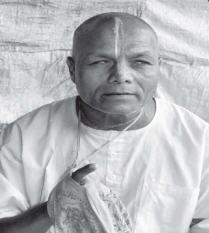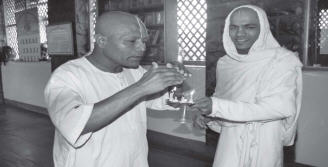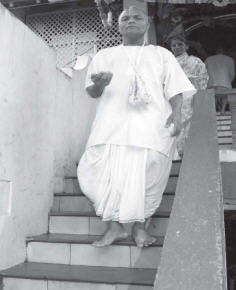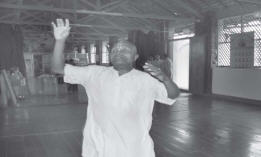The power of devotional service manifests brilliantly through an unusual person.

I am sitting in the first floor room of the brahmacari asrama in the ISKCON temple in Belgaum, India, honoring the dinner prasada. Outside, the evening twilight is slowly being enveloped by a veil of darkness helped by the absence of the electric current which is so common in the towns of India. The room I am in is dimly lit by a single emergency bulb.
I finish my prasada, get up to wash my plate, and step outside. It is dark. My eyes take a few seconds to adjust; still I can barely make out the steps in front of me. Suddenly, I am greeted by the loud singing of Hare Krsna from the verandah below. I look there. It’s jet black, no one can be seen.
“Who is chanting in such darkness?” I ask the devotee behind me.
“It is Bilvamangala Thakura Dasa,” the devotee replies. “Night or day does not make any difference to him. For him every thing is night because he is blind.”
“What!” my jaw drops.
“But he is happy chanting the holy names,” the devotee adds, and excuses himself.
I stand there peering down, unable to see anyone. Oblivious to the night Bilvamangala Thakura continues to chant: Hare Krsna, Hare Krsna, Krsna Krsna, Hare Hare/ Hare Rama, Hare Rama, Rama Rama, Hare Hare.
INDEPENDENT LIFE
I see Bilvamangala Thakura Dasa the next day in the mangala arati. He is of medium height and age but well built, wears white dhoti and kurta, with his head shaven, sikha, and a smudgy tilaka on his forehead. He sings joyfully and loudly shouts “Gauranga,” “Jaya srila Prabhupada,” in the chorus. When the kirtana picks up he jumps and spins around with arms upraised, frequently marking his position by touching the wall on his left. Many devotees dance with their arms around him and he laughs and jumps with them. Later he sits down to chant his japa with us and after a short break even joins in guru püja and the Bhagavatam class.
After the breakfast, I go to the verandah to hang my washed clothes for drying. There I find him honoring breakfast. I sit down to observe him; it is my first experience of seeing a blind person so closely.
Bilvamangala Thakura eats with gusto. After eating he gets up and walks to a tap, washes his hands and mouth, cleans his plate, returns to his sitting place, and much to my surprise, wipes the floor with a rag. He then keeps his plate next to the wall, picks up his bead bag and begins chanting Hare Krsna. He appears adept at carrying out his basic needs without much help.
For the next few days I observe him and learn about his daily life from others.
His day begins much before 3 am. He chants all the prayers sung during mangala arati, even the premadhvani prayers during which he bows down. Then he begins japa. At 4:30 am someone gets him to the temple for mangala arati. After the morning program he honors prasada. Then throughout the day he chants his rounds, taking break to honor prasada and attend to bodily needs. In the evening he again sings songs and prayers in glorification of Supreme Lord and His devotees. He does not need drums or cymbals; when he is standing he claps with both hands and dances, and when he is sitting he beats his hand on his thigh. Either he chants or he sings and most of the day and night is spent like this.
I am intrigued and want to find more about him. For this I meet Uttama sloka Dasa and Nagendra Dasa and also interview Bilvamangala Thakura. Some excerpts from his life story follow:
PULL OF GOD

Bilvamangala Thakura was born the eldest of three siblings in the year 1949. After his birth, the family priest told the mother to name the child Narayana. Young Narayana was fond of listening to the abhangas (devotional poems) of the great Vaisnava saint of Maharashtra, Tukarama Maharaja. He would memorize them and recite them along with stories of the Lord to his friends and family members. Most of his listeners, however, were not interested being caught in worldly duties; yet they marveled at the young child’s devotional proclivities.
At the age of ten Narayana contracted an eye ailment that pestered him for one year, finally ending only by claiming both his eyes. His family supported him, but he had to discontinue his education. His solace was a tape recorder which played bhajanas and kirtanas.
Over the years, his family took him to many holy men and places to cure his vision, but nothing could be changed. Narayana began to lose faith in them. Meanwhile, his younger brother came in touch with the Hare Krsnas and began to chant and even induced the family members to accept Krsna consciousness. Narayana, however, was not willing to change.
“I prayed to all the gods and demigods,” he said, “but there was no result. What will your chanting beads do?” Then one day, Narayana put forward a demand unheard of: “Give me an egg to eat,” he said to his mother. All his life he had not even touched onion and garlic, but now, even as his mother repeatedly stopped him, he forced her to give him a boiled egg.
He ate the egg in the night and went to bed. But there was no sleep. A virulent rash appeared on his body and he spent the whole night painfully itching his body from his feet to his head. The next day, when his mother woke him up, he confessed his suffering to her.
“My dear son,” the mother said, “Chant this Hare Krsna. It will surely help you.”
“Bring me the beads,” Narayana told her. “Look mother,” he said, “if these beads are right, they should remove all my suffering. If not, I will cut them into a thousand pieces and throw them in the gutter. But in case they help me, I promise, I will never leave chanting.”
Narayana began to chant. He had been suffering from a strange fever for fifteen days and no medicine seemed to work, but as he chanted his condition improved. Gradually he developed faith and taste in chanting and began to chant more rounds: 20, 32, and sometimes even 64. Soon he became a regular visitor to the temple, coming along with his brother Prahladananda Dasa and the entire family.
After his mother’s death in 2001, he was inspired to move into the temple. The resident devotees were unimpressed. “How can we keep a blind man in the temple?” they questioned. “Who will take care of him?” These and many other doubts arose before the authorities.
The temple president, Devamrta Dasa, intervened. “I knew of Narayana’s profound taste for holy name,” he says. “If he could adjust in the temple, we had no problem.”
Narayana got a small room which he shared with others. He quickly adapted to his new surroundings and was neat and clean in his appearance and surroundings. He only needed help from someone to get him prasada and take him to the first floor temple hall. He bathed, shaved his face, washed his clothes and dried them, took care of his belongings all by himself. When the roof of his room leaked in rains, he took rice gunny bags that were left over after the Sunday feast, tore them from the edge and sewed them to make a tent. He now sleeps in this tent that doubles up as a mosquito net and even serves him well during the grueling winters.
His spirits see no barrier. So with the help of devotees and the free train passage allowed by the Government, he also went on pilgrimage to Mayapura, Vrndavana, Jagannatha puri, and Tirupati.
In 2008 he received harinama initiation and got the name Bilvamangala Thakura Dasa.
STURDY FAITH IN THE HOLY NAME

With this information in hand I take along with me Uttama sloka Dasa, Bilvamangala Thakura’s friend, and conduct this interview. Following are some excerpts:
BTG: You have lost your vision. Don’t you feel God did an injustice to you?
Bilvamangala Thakura Dasa
(BTD): Earlier I used to feel bad, but not now, after coming to bhakti. Now I feel that because I don’t have vision, the Lord has kept me here in His service.
BTG: Still, you cannot take darsana of the Lord. Don’t you feel bad about it?
BTD: No. The Lord is present in His name. Lord Krsna has said, “Chant My name and I will be with you.” I feel so. Few days back I fell down near the gate and was injured. The Lord told me, “Don’t fear; I am with you.” Although I went to the doctor, I had no faith in him; I had full faith in the Lord, and eventually the Lord cured me.
BTG: How can you chant so much?
BTD: I don’t get much sleep: threefour hours at the most. When I am awake I take shelter of the Lord, and He gives me mercy. I feel that if I surrender to Him, it will be good.
BTG: How do you feel when you chant?
BTD: I feel good.
BTG: Can you describe it in more detail?
BTD: Look, I am illiterate; I don’t know much philosophy. I told you it feels nice when I chant, that is all.
BTG: What gives you taste in chanting?
BTD: Tulasi Devi gives the taste. . . and Krsna. I pray to my chanting beads before chanting. A few years ago, I had a dream in which Srila Prabhupada came and told me to take shelter of Tulasi Devi. Here, (he points to his right to a garden) there is Tulasi. Every day I bow to her and sing her prayers. And I live here in this courtyard, and do my bhajana and kirtana. Sometimes I chant 32 rounds, sometimes more. And on Ekadasi I fast and chant 64 rounds or even more.
BTG: Have you read Srila Prabhupada’s books?
BTD: No. I only studied till 4th standard. But I regularly hear temple classes.
BTG: Did you stitch this tent in which you live?
BTD: Yes.
BTG: How could you do it? You cannot see?
BTD: Radha-Gokulananda gave me the intelligence. Earlier I lived in the room behind me. During the rains its roof leaked. Nobody fixed it. Then Radha-Gokulananda told me to make this tent.
BTG: What is your message to our readers?
BTD: Perform devotional service. Take shelter of Lord Krsna. You will be benefited. What I did, you also do. You will get mercy of the Lord and you will go ahead. If He does not have mercy on you, you cannot do anything. Here I am a blind man, but He is taking care of me. Even if I keep servants, they will not take care of me as nicely as these devotees are doing. How much more He will take care of you. So, just take shelter of the Lord.
BTG: Thank you.
Later Uttama Sloka recalls an anecdote: “Once when Devamrta Dasa returned to the temple after a long gap, many devotees were complaining about their issues. But when he came to this place he found Bilvamangala Thakura blissfully chanting kirtana and dancing. ‘It seems,’ Devamrta said, ‘that Bilvamangala Thakura is the only satisfied devotee in the temple.’ Really Bilvamangala Thakura is an inspirationto so many of us. The whole day he is immersed in harinama.”
A CLEAR VISION

I return after the meeting to my room. Outside a train rushes past loudly whistling and shaking the earth by its massive wagons carrying petrol. I look out of the window at the speeding train, and think about the modern day world that is so rapidly turning atheistic. Brilliant scientists, scholars, philosophers, writers, common people all appear to be so ignorant and going away from God. On one hand, we have people with eyes who fail to perceive the role of God in creation, and on other hand here we have Bilvamangala Thakura, a person without vision, who can so clearly perceive the hand of God in his life.He “sees” God in His names, and realizes His mercy in the love and support that appears internally in his heart and externally in the kindness of devotees. The divine songs that may appear to us as ordinary words reveal their transcendental potency to him so much so that nearly all day and night he joyfully sings them. The process of devotional service that may appear tedious to us becomes a natural asylum for him. It is not that he pretends; he cannot fake anything for so long or fool so many. His faith and satisfaction in the process of devotional service is real.
One marvels at the power of the process of bhakti, which can cutacross any material impediments and reveal the ultimate truth even to a blind person. One also marvels at the devotees of the Lord, who can think beyond ordinary sensibilities and offer shelter and support to a seemingly non-productive aspiring devotee. And one completely marvels at the all-attractive Supreme Lord who, by His unlimited power, can provide a blind man with divine vision and faith. With so many manifestations of the glories of the process of devotional service clear before my eyes, I can only offer my prayers repeating the words of the original blind Saint Bilvamangala Thakura, who writes in his celebrated book, Krsna-karnamrta: “My dear Lord, You are the ocean of mercy. With my arms placed upon my head, I am bowing down before You with all humility and sincerity. I am praying unto You, my Lord. Would You be pleased just to sprinkle a little of the water of Your glance upon me? That will be a great satisfaction.”
(Quoted by Srila Prabhupada in Nectar of Devotion.)
The author acknowledges the help of Uttama sloka Dasa, Nagendra Dasa, Atul Krsna Dasa, and Devamrta Dasa (Temple President) of ISKCON Belgaum in compiling this article.
(Photos by Vrajajana Dasa)
